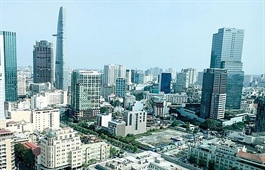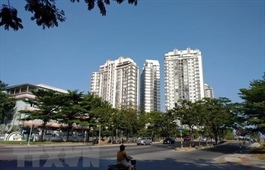Residential leasing grappling with challenges
Residential leasing grappling with challenges
After hospitality and retail space, the residential leasing segment in Vietnam has sustained a serious hit from the pandemic.
Hoang Nguyen, the owner of an apartment for lease in District 7 of Ho Chi Minh City, told VIR that he has reduced rental from VND19 million to VND15 million ($826 to $650) per month for his 100-square-metre unit. The tenant, however, is still struggling and requested an even lower rate.
“I cannot reduce rent any lower because I still have to pay a bank loan. The rate I offered is the lowest that I can afford right now,” Hoang told VIR.
Hoang is still luckier than his younger brother, Huy Nguyen, who has a unit in Binh Thanh district which is leased to a German businessman.
Huy said that his tenant has been stuck in Germany since April and cannot return to Vietnam due to travel restrictions.
“My tenant has not been here for more than four months, so I have not received rent for that time. I really do not know when he can come back to Vietnam and how much rent I can charge him,” Huy said.
He added that his tenant has suggested that he finds another tenant in the meantime, but the low demand in the current market means such a solution is not that easy to reach.
If the unit is still vacant at the end of August, Huy says he will have to sell the apartment to avoid more suffering.
Nguyen Xuyen, a realtor in Ton That Thuyet apartment building located in District 4 of Ho Chi Minh City, said that due to COVID-19, many foreigners have scrapped their plans to work in Vietnam. “The absence of foreign tenants is leading to a serious drop in income for landlords. Despite utilising various methods of advertising and offering more incentives, demand remains low,” Xuyen said.
Currently, Xuyen has to carry out extra jobs by shipping goods for supermarkets and online traders.
While the buy-to-lease segment is in a difficult situation, landlords of serviced apartment projects seem to have had better business and are actively seeking alternative solutions in order to keep existing tenants.
Some serviced apartment operators such as Glenwood Suites and Thien Son have applied reductions on rent. Others such as Sherwood Residence and City House Apartment have extended the deadline for long-term tenants for when they can enter the country.
Lew Yen Ping, regional general manager for Vietnam, Cambodia, and Myanmar at Ascott – the biggest serviced apartment operator in Vietnam – told VIR that it recently launched the Ascott Cares programme while also partnering with Bureau Veritas Vietnam, which provides independent audits and certification for hygiene and safety standards to reassure both guests and staff.
“To ensure that Ascott remains a dominant lodging player in the new normal, we continually adapt new business strategies to future-ready our company. We are evolving our lodging products and services to cater to new customer segments,” said Ping. “With the launch of Ascott’s ‘Work in Residence’, we are capturing opportunities on the rising telecommuting trend to offer a comprehensive solution for guests to live and work in a safe and private space.”
Ping added that at Somerset Grand Hanoi, Somerset Ho Chi Minh City, and Citadines Bayfront Nha Trang, select apartments have similarly been converted into private workspaces.

Ascott – the biggest serviced apartment operator in Vietnam – recently launched many programmes to enhance guest experience
|
Apart from this, Ascott is also optimising the use of space at its properties to enhance the guest experience through its "Space-as-a-Service" initiative.
“In Vietnam at these apartment buildings, we have converted some of the apartments into yoga studios to attract both instructors and practitioners,” Ping said.
Many landlords have meanwhile used this time to renovate and improve their property to be more competitive, preparing for it and when the pandemic is controlled.
Moreover, for some serviced apartment projects, in order to limit the risk of the pandemic, landlords have refused short-term or daily stays, impacting the efficiency of the project.
According to Savills Vietnam, in the first half of this year, Ho Chi Minh City is home for more than 6,400 serviced apartments from 109 projects. This got the occupancy of 61 per cent, reducing 22 per cent on-year. The average rent was $23 per square metre per month, a 19-per-cent fall on-year.
Grade B apartments have been the most affected due to the dependence on short-term stays.
Especially, one-third of projects are offering a discount of 20 per cent of the rent or offering free water and power bills for a maximum of three months.
According to Nguyen Van Dinh, deputy chairman of the Vietnam Real Estate Association of Realtors, many tenants have to move to lower grade residences to protect their budgets at this difficult time.
“However, this reduction is to last for the short term only. When the pandemic is controlled and borders open, demand will resume once again, and so will the residences,” Dinh said.


























